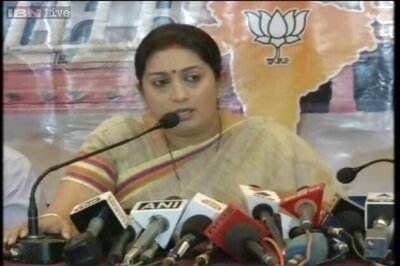
views
Tehran: A European offer asking Iran to give up its uranium enrichment programme in return for a package of incentives would be like accepting candy in payment for gold, Iranian President Mahmoud Ahmadinejad said on Wednesday.
"They say we want to give Iranians incentives but they think they are dealing with a four-year-old, telling him they will give him candies or walnuts and take gold from him in return," he told a crowd in the central city of Arak.
"Don't force governments and nations who are signatories to the atomic Non-Proliferation Treaty to pull out of it," he added in remarks broadcast live on state television. Britain, France and Germany, the EU's three biggest powers, plan to offer Iran a light-water nuclear reactor as part of a package of incentives if Tehran agrees to freeze its uranium enrichment programme.
EU diplomats said on Tuesday they would be very surprised if Iran accepted but would take a rejection as confirmation that its nuclear programme does not solely aim at generation for peaceful ends.
The US and EU accuse Iran of pursuing nuclear weapons under cover of a civilian atomic energy programme, a charge Tehran denies. A European Union diplomat said political directors from the "EU3" and the office of EU foreign policy chief Javier Solana would discuss the proposal with US, Russian and Chinese counterparts in London on Friday.
"The EU3 and Solana are planning an offer of a European light-water reactor to Iran in return for a suspension of its enrichment programme," the diplomat, familiar with the negotiations on Iran, told Reuters on condition of anonymity.
Nuclear experts say light-water reactors are more difficult to use for weapons purposes than heavy-water plants.
The EU trio first proposed offering Iran light-water technology in 2005, after two years of negotiations. At the time, the Iranians said the offer lacked specific incentives.
EU diplomats said the new offer would be more specific, partly because they were confident of full US support.
But they made clear they saw little prospect that Iran would accept, and were aiming above all to demonstrate to sceptics such as Russia and China that the West was not trying to deprive Iran of civilian nuclear energy.




















Comments
0 comment